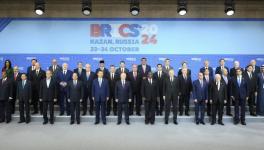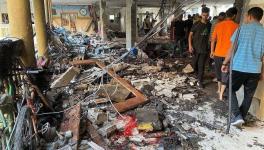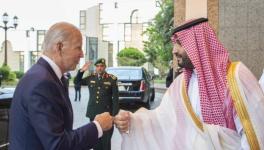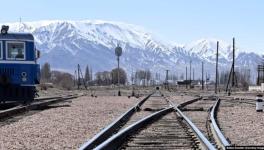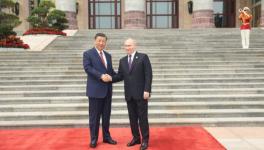Turkey, Russia Take Time Out in Libyan War
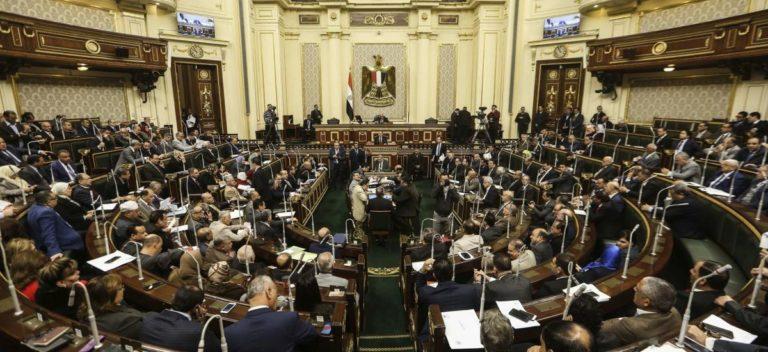
Parliament in Cairo unanimously voted on July 20, 2020 to authorise dispatch of Egyptian troops on combat missions abroad
Just as the Mediterranean air is thick with talk that a military confrontation between Turkey and Egypt is brewing over control of Libya, Russian Deputy Foreign Minister Sergey Versihinin flew into Ankara for consultations with his counterpart Sedat Önal on July 21. The two diplomats have since come out with a joint statement that they have agreed to consider creating a joint working group to push for a Libya ceasefire and an intra-Libyan political dialogue.
The development can only be seen with a sense of deja vu — Moscow and Ankara fighting and bonding at regular intervals. Like in Syria, the two regional powers are actively supporting rival Libyan factions in that country’s hybrid war, and would now like the world community to believe they can also be the custodians of peace.
This latest ceasefire may serve a purpose, nonetheless as it postpones a direct Egyptian military intervention in Libya on the side of the opposition forces against the established government in Tripoli backed by the Turkish military.
The fact of the matter is that neither Russia nor Egypt wants anything more than a hybrid war in Libya, which gives them the leeway to push the envelope at affordable cost. Politically also, Russia and Egypt are on a weak wicket by backing renegades, while Turkey is at least backing the UN-recognised established government in Tripoli. It is Syria in reverse. The Russian and Egyptian interference is illegitimate while Turkey has a formal security agreement with the government in Tripoli to render help.
Last week, President Trump spoke to the presidents of Turkey and Egypt — Recep Erdogan and Abdel Fattah Al-Sisi — counselling a ceasefire. Trump enjoys good personal rapport with both ‘strongmen’. A flare-up in Libya will not suit Trump at this point when he is grappling with the pandemic and a tough re-election bid and a US intervention is simply unthinkable.
Russia closely coordinates with Egypt but is conscious that although Egypt possesses the strongest standing army in the region — one that is equipped and trained in modern warfare and which can stop Turkish incursions in the Arab region — Turkey happens to be a NATO power, and any entanglement in such a conflict between the two regions states will impact Moscow’s core interests elsewhere too.
At any rate, Sisi also seems be grandstanding without any real zest to order his troops into Libya. Sisi has strong domestic compulsions to be seen as a ‘strong’ leader at a time when Grand Ethiopian Renaissance Dam on the Nile threatens to harm Egyptians’ access to their water lifeline. Besides, Egypt has its own internal security problems and a restive population which disapproves of military expeditions abroad.
Having said that, Egypt’s parliament late Monday gave Sisi the green light for possible military intervention in Libya by approving the deployment of armed forces abroad. Egypt’s state-run Al-Ahram daily reported on Sunday that the vote in parliament was intended to mandate Sisi to “intervene militarily in Libya to help defend the western neighbour against Turkish aggression.”
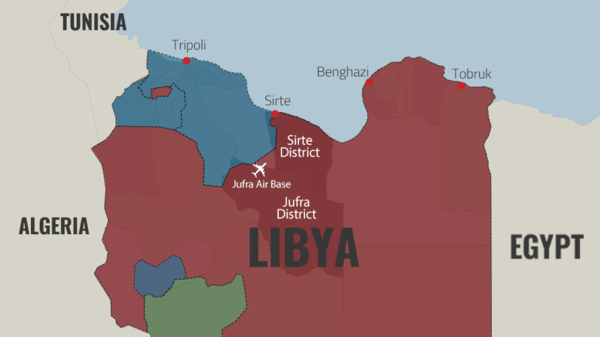
Having said that, Sisi was not merely sabre-rattling when he said last weekend that he would regard the eastern city of Sirte on the coast and the nearby airbase of al-Jufra as a “red line”. To be sure, there are intense fears in Cairo that a Turkish presence on its porous western border could pose a grave security threat.
Egypt, UAE and Saudi Arabia suspect that Erdogan intends — with generous Qatari bankrolling — to instal a Muslim Brotherhood government in Libya, which would rekindle the embers of the Arab Spring and put Islamism back again as the ideology of the New Middle East. A noted Egyptian political commentator and author on the Arab Spring and the Brothers wrote this week that “the current crisis in Libya is an existential crisis for Egypt’s security, and it cannot be taken lightly, even as the Egyptian army, backed by a strong nation, will ultimately prevail.”
The Turkey-backed government forces in Tripoli have vowed to retake the crucial al-Jufra airbase and Sirte, which provides access to Libya’s main oil ports. On the other hand, Russia has reportedly begun sending fighter jets and additional mercenaries to beef up the defence line in Sirte and Juffra. Equally, there are reports that with Russian backing, Syrian President Bashar Assad has also sent some 2,000 Syrian soldiers and mercenaries while Turkey has dispatched more than 16000 Syrian rebel fighters, including 2500 erstwhile fighters of the Islamic State, to the Libyan frontline.
Contradictions are galore in the situation surrounding Libya. Within hours of the joint statement issued in Ankara on Tuesday, Erdogan’s top security adviser, Ibrahim Kalin told the Reuters news agency, “For the ceasefire to be sustainable, Jufra and Sirte should be evacuated by (the eastern Libyan warlord) Haftar’s forces.” Kalin also challenged Sisi saying that any Egyptian deployment in Libya would hamper efforts to end the fighting and would be risky for Cairo. “I believe it will be a dangerous military adventure for Egypt,” he said.
Turkey appears to have convinced itself that it enjoys tacit US backing, given the potential that its Libyan intervention holds to roll back the Russian influence in a strategically important region which is the NATO backyard. The Pentagon and its African Command Centre estimate that Russia is looking to use the local air and naval ports to establish a beachhead in Sirte and expand its Mediterranean influence and access to Libyan resources.
All in all, a variety of actors — big, medium, small and very small — have put their finger on the Libyan scale to gain some advantage. The Turkish military contingents, Emirati and Egyptian weaponry, Saudi money, and the Russian, Syrian, Tunisian, Chadian, Sudanese — and even Somali — mercenaries have fostered the image of a bloody free-for-all in the oil-rich country. None of the interventionists would be easily persuaded to leave Libya alone.
Get the latest reports & analysis with people's perspective on Protests, movements & deep analytical videos, discussions of the current affairs in your Telegram app. Subscribe to NewsClick's Telegram channel & get Real-Time updates on stories, as they get published on our website.










